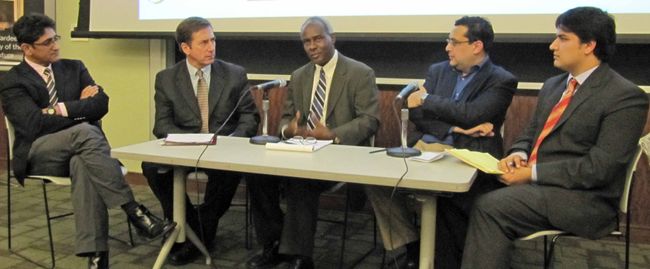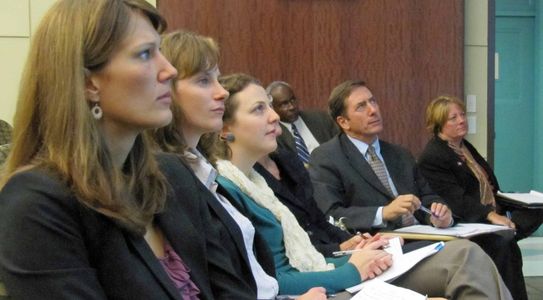Experts Discuss Philanthropy and Disasters in Pakistan and Haiti
Over a hundred people from across the Boston area gathered at Boston University on November 4, 2010, at a discussion on on the current situation with the devastating floods in Pakistan and the ongoing impacts of Haiti’s earthquake earlier this year, and in particular on the lessons that can be learnt from these two experiences about philanthropy and disasters.
The event was held at Boston University and was co-hosted by the New England International Donors (NEID) and the Boston University Pardee Center for the Study of the Longer-Range Future in collaboration with Association of Pakistani Physicians of New England (APPNE), the Belfer Center for Science and International Affairs at Harvard Kennedy School, the United Nations Association of Greater Boston, WorldBoston and The Boston Foundation.
The event began with an information session on the Pakistan floods, with brief presentations by Prof. Adil Najam, Faris Islam and Dr. Nadeem Afridi. Prof. Najam shared the big picture on the floods in Pakistan with facts and figures. Faris Islam, an Pakistani undergraduate from Tufts University who was back home for summer vacation when the floods hit shared how the Pakistani citizenry organized themselves with flood relief efforts while Dr. Afridi provided an insight on what the Association of Pakistani Physicians of New England (APPNE) is doing in their relief efforts as part of the Pakistani diaspora.

This was followed by a panel discussion on what lessons can be learned from the philanthropic and humanitarian responses to the two recent crises. There was lively conversation among the 5 panelists: Dr. Alix Cantave of the William Trotter Institute at the University of Massachusetts, Boston and a leading scholar of Haitian studies, James F. Smith, former Foreign Editor at The Boston Globe and currently Communications Director at the Belfer Center for Science and International Affairs at Harvard University’s Kennedy School, Dr. Nadeem Afridi and Faris Islam, and the audience. Prof. Najam moderated the session.

Dr Cantave kicked off the panel discussion by sharing with the audience the current situation in Haiti and how Haitians are still very much in need in the aftermath of the earthquake. Jim Smith explained the role and responsibility of the media in portraying disasters and igniting public and international response. In their discussion, the five panelists shared the experiences in Haiti and Pakistan and outlines various factors that were similar and different in the two countries.
This was followed by a lively question and answer session with spirited participation from an energized and informed audience that included representatives of major relief and development organizations as well as citizen activists and scholars. The wide-ranging and thoughtful discussion from the floor and responses from the panelists touched on issues such as the efforts of international, non-profit and grassroots organizations in Haiti and Pakistan, the role of national governance and governments in disaster relief, what the individual can do to support relief and humanitarian efforts, and how the mainstream media and new media can assist and shape these efforts. Topics such as building capacity and usage of funds were also discussed.
The session ended with closing remarks from the panelists and with Prof. Najam noting that our greatest resource is the expressions of the generosity of spirit, especially those that can nurture the resilience of ordinary people even in times of great adversity.